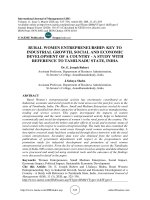Economic growth and economic development 186
Bạn đang xem bản rút gọn của tài liệu. Xem và tải ngay bản đầy đủ của tài liệu tại đây (65.11 KB, 1 trang )
Introduction to Modern Economic Growth
This definition encapsulates the three important elements that make up institutions.
First, they are “humanly devised”; that is, in contrast to geography, which is outside
human control, institutions refer to man-made factors. Institutions are about the
effect of the societies’ own choices on their own economic fates. Second, institutions
are about placing constraints on individuals. These do not need to be unassailable
constraints. Any law can be broken, any regulation can be ignored. Nevertheless,
policies, regulations and laws that punish certain types of behavior while rewarding
others will naturally have an effect on behavior. And this brings the third important
element in the definition. The constraints placed on individuals by institutions will
shape human interaction and affect incentives. In some deep sense, institutions,
much more than the other candidate fundamental causes, are about the importance
of incentives.
The reader may have already noted that the above definition makes institutions
a rather broad concept. In fact, this is precisely the sense in which we will use the
concept of institutions throughout this book; institutions will refer to a broad cluster
of arrangements that influence various economic interactions among individuals.
These economic, political and social relations among households, individuals and
firms. The importance of political institutions, which determine the process of
collective decision-making in society, cannot be overstated and will be the topic of
analysis in Part 8 of this book. But this is not where we will begin.
A more natural starting point for the study of the fundamental causes of income differences across countries is with economic institutions, which comprise such
things as the structure of property rights, the presence and (well or ill) functioning
of markets, and the contractual opportunities available to individuals and firms.
Economic institutions are important because they influence the structure of economic incentives in society. Without property rights, individuals will not have the
incentive to invest in physical or human capital or adopt more efficient technologies. Economic institutions are also important because they ensure the allocation
of resources to their most efficient uses, and they determine who obtains profits,
revenues and residual rights of control. When markets are missing or ignored (as
was the case in many former socialist societies, for example), gains from trade go
172









